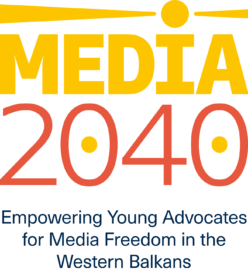CONTENT CREATION
Which technological developments affect the content creation (news gathering, news genres and formats, layout)? How are they changing?
- There is a growing number of internet-native media outlets that present their news only in online format. Also, the podcast format is gaining popularity.
- Digital technology media brings new genres and new types of journalism (i.e. mobile journalism, data journalism), with large private media newsrooms and investigative portals being the leaders of the change. However, the new technological possibilities are not utilized to the full extent and adoption of new technologies is rather slow.
- There is growing struggle for users’ attention, that leads to the lowering of the quality of content.
- With its multiple content creators and distributors, new media is the source of disinformation that permeates the region of WB.
- The use artificial intelligence (AI) is only beginning, and it is used both for creation of information and disinformation.
CONTENT DISTRIBUTION
Which technological developments affect the content distribution?
- Internet access is on the rise, with the expansion of broadband connection. Widespread use of mobile phones has further facilitated internet access in WB.
- Digitalisation of TV (‘digital switchover’) is not yet finished in BIH and KOS, and the whole process is controversial.
- A key way in which social media are shaping content distribution is through algorithms.
- AI is playing an increasingly important role in content distribution, particularly in the areas of content curation and personalization.
PROFESSIONAL CHANGES
What new tasks are placed on journalists? What challenges to ethics and conduct come with technological development?
- The tasks of journalists are multiplying, so apart from news reporting they need to engage with audiences, prepare stories and visuals for different platforms, compete for likes, shares, and other social media currency.
- The ease with which personal information can be collected and shared over the Internet is one of the key ethical concerns for media and journalists.
- AI holds numerous challenges for media and journalists, and threatens to make the profession obsolete. Still, there are no guidelines in newsrooms or from the press councils on how the use AI technology ethically.
CITIZENS
MEDIA USE
Which new platforms are audiences using, and how?
- Throughout the region the most popular social media platform is Facebook, while journalists and politicians frequently use X (former Twitter) to share news. Instagram and TikTok are on the rise, with teenagers being avid TikTok users.
- Digital gap can be observed between younger, urban and well of citizens who use the Internet regularly, and older, rural and poorer population who use it less frequently.
- Popularity of social media influencers is growing, especially among the youth, affecting the traditional media economy.
- Social media talk is highly polarized. Numerous instances of hate speech are registered in WB, with intellectuals, scientists, government critics and journalists being frequent targets of attacks.
MEDIA LITERACY
What are the digital news competences of citizens? Are citizens prone to disinformation?
- WB region has low levels of media literacy. In the self-assessment reports citizens say that they have a need to be more media literate to navigate digital media environment.
- Citizens are prone to disinformation that is equally shared on social media and on online portals.
CITIZEN JOURNALISM
How the rise of citizens produced content affects journalism.
- User generated content heightens the competition for the attention of users, making it harder for media to reach its audiences.
- Citizen journalism on a local level is seen as not necessarily bad because it helps the community get its voice.
EU DIMENSION
- The EU is actively formulating its policy in relation to digital technology challenges: Audiovisual Media Services Directive, General Data Protection Regulation, Digital Services Act, Digital Market Act, and Code for Disinformation. The Artificial Intelligence Act is also proposed
- Most of the EU technology related policy is not implemented in the WB and there are no monitoring efforts in
Key takeaways about Technology.
